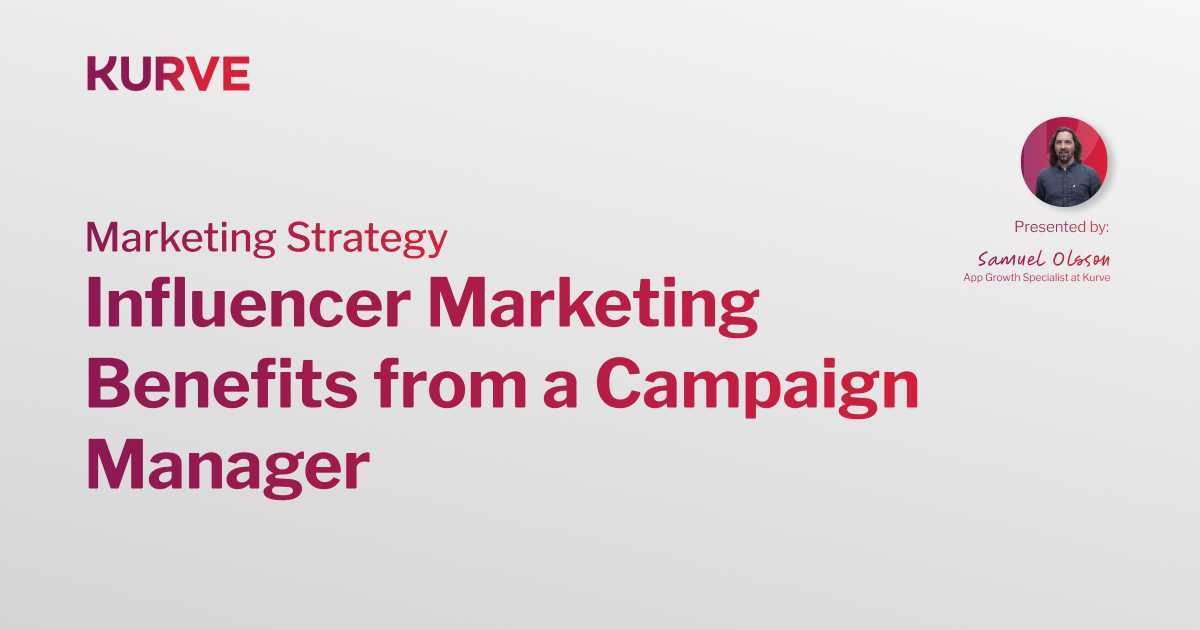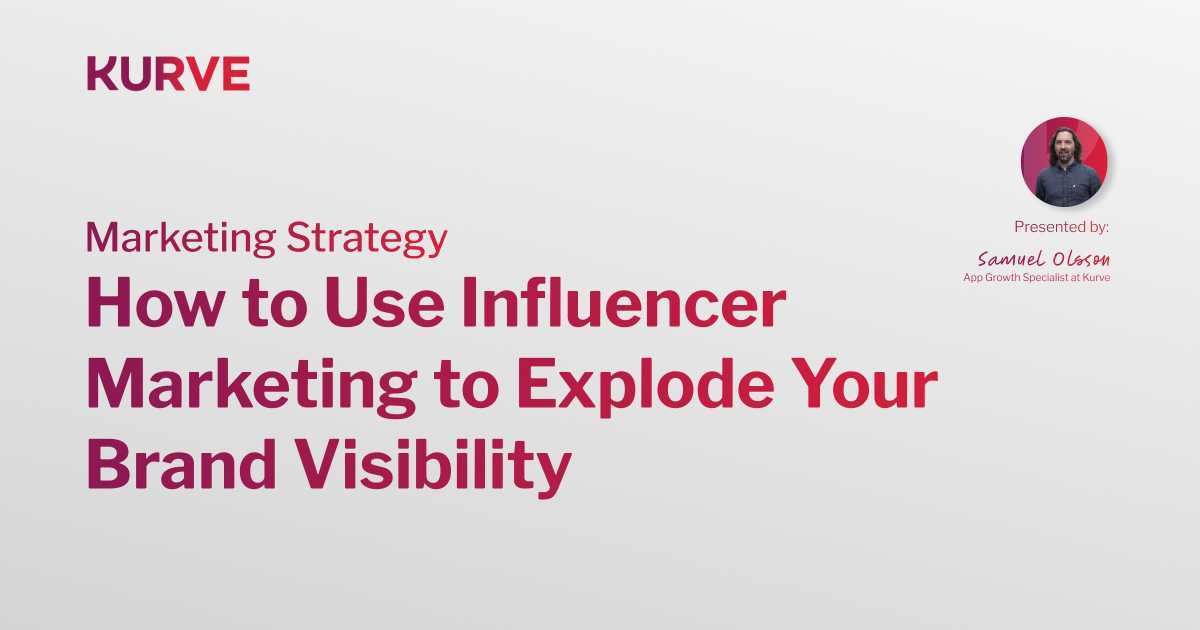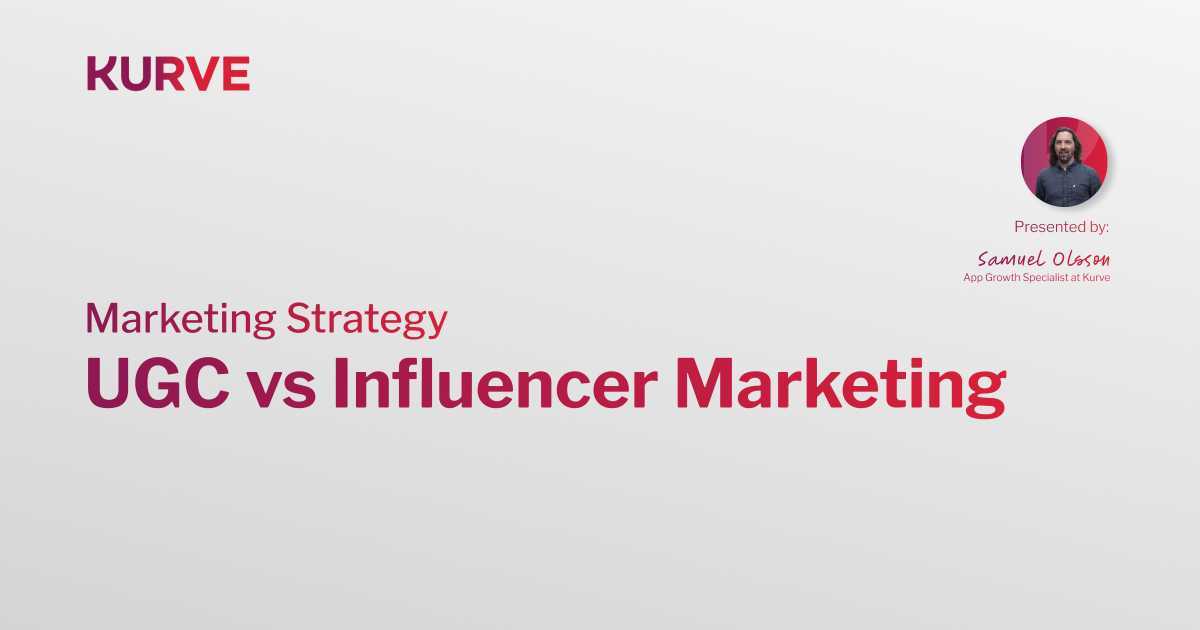Mobile App Marketing: The Only Guide You'll Need in 2025
Mobile app development is revolutionizing how we interact, work and entertain ourselves. Yet, with millions of apps vying for attention in a hyper-competitive market, marketing your mobile app requires extensive time and effort. That's why many businesses delegate this work to marketing agencies like us here at Kurve.
This guide will break down the step-by-step process of designing a winning marketing strategy for mobile apps. We will explore various marketing techniques, industry trends and real-life case studies to help you stay ahead of the competition.
To get inspired, check out our case study on Sweatcoin, which showcases how effective marketing can propel an app to success.
What is Mobile App Marketing?
Mobile app marketing is promoting and creating awareness for mobile applications. It involves a range of tactics; app store optimization, user acquisition campaigns and targeted messaging. The goal is to attract and retain users.
For example, imagine a revolutionary bug-tracking app designed for product managers. The app enables product managers to track, prioritize and resolve issues. By implementing a comprehensive mobile app marketing strategy, including compelling app store descriptions, targeted advertising and influencer partnerships, the app can reach its intended audience, showcase its unique features, and demonstrate how it solves real-world challenges for product managers.
Mobile app marketing means communicating its value proposition, highlighting its benefits, and engaging with the target audience through various channels. In sum, it can drive an app's success.
Mobile App Marketing VS Mobile Marketing
Mobile app marketing and mobile marketing often need clarification but have distinct differences.
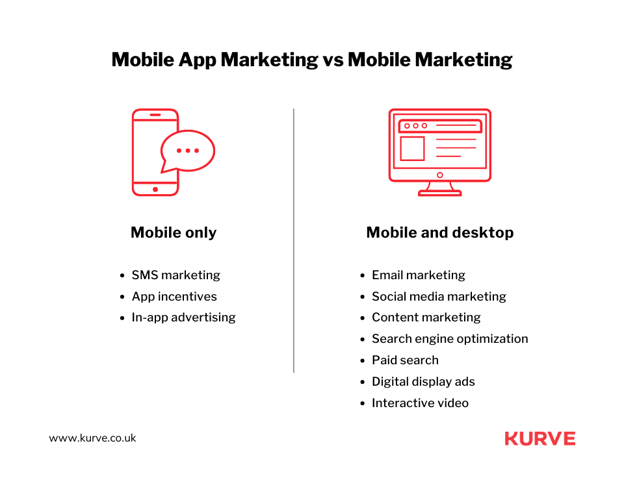
RetentionMobile app marketing focuses on promoting and creating awareness for mobile applications. This ensures their visibility, engagement and adoption by the target audience.
The critical components of mobile app marketing include:
- Optimizing the app's presence in app stores.
- Driving user acquisition through various channels.
- Implementing strategies for user engagement and retention.
Mobile marketing encompasses a broader scope, including all marketing efforts directed toward mobile devices, such as smartphones and tablets. It involves strategies like mobile advertising, search optimization, and mobile-responsive website design. Mobile marketing aims to reach and engage users across various mobile channels and platforms.
The main differences between mobile app marketing and mobile marketing are:
- Focus: Mobile app marketing promotes and optimizes mobile applications. Mobile marketing encompasses a broader range of marketing efforts directed toward mobile devices.
- Objectives: Mobile app marketing aims to drive app adoption, engagement and retention. Mobile marketing focuses on reaching and engaging users through mobile channels for various marketing purposes.
- Tactics: Mobile app marketing utilizes tactics like app store optimization and user acquisition campaigns. Mobile marketing employs strategies like mobile advertising and search optimization.
Now that we understand the distinction between mobile app marketing and mobile marketing let's explore why marketing for mobile apps is essential.
Why is Marketing For Mobile Apps Needed?
Mobile app marketing is a specialized and niche type of marketing that offers unique benefits to app developers and businesses.
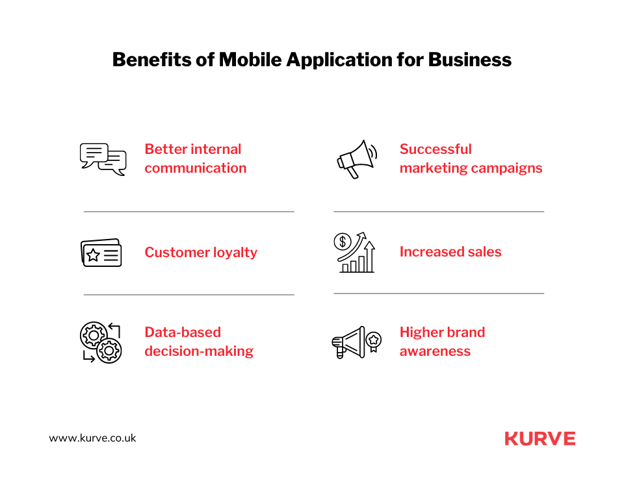
Benefits of Mobile App Marketing include:
- Target a specific audience interested in mobile apps
- Increase chances of reaching engaged and converting users
- Optimize your app for better visibility in app stores
- Personalize and target communication with users
- Foster deeper connections and increase user loyalty
- Enable data-driven decision-making for optimized strategies
The importance of mobile app marketing lies in its ability to drive app visibility, user acquisition and engagement. By implementing effective mobile app marketing strategies, you can increase app downloads, enhance user engagement, build brand loyalty, and generate revenue.
Marketing mobile apps is crucial for cutting through the app market noise and realizing their true potential.
The following section will explore the three stages of mobile app marketing. It will provide insights into each stage's key components and strategies.
Three Stages of Mobile App Marketing
Mobile app marketing is not a single process. It is a multi-stage procedure that involves various strategies and techniques. Many people make the mistake of focusing on one aspect of marketing, neglecting the holistic approach needed for app success.
To navigate the complexities of mobile app marketing, you need to understand the three stages that form the foundation of a comprehensive marketing strategy: Awareness, Acquisition, and Retention.
Each stage plays a vital role in the success of your mobile app.
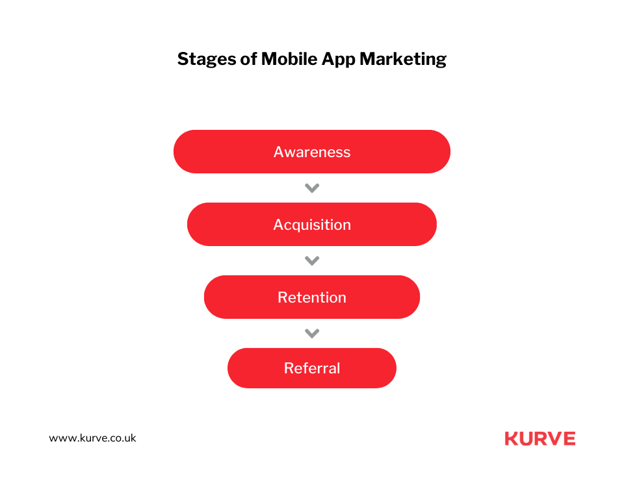
- Awareness: This stage focuses on creating visibility for your app and generating interest among potential users.
- Acquisition: Once you establish awareness, the acquisition stage involves converting interested users into app downloads and new users.
- Retention: After acquiring users, the retention stage aims to keep them engaged, satisfied, and returning to your app.
Within each stage, there are many sub-steps and strategies to explore. So let's deep dive into each stage, uncovering the key components and best practices to maximize your app's success at every step of the mobile app marketing funnel.
Awareness
Awareness is the first stage of mobile app marketing. It focuses on creating visibility and generating interest for your app. This involves strategic planning and execution to ensure your target audience understands your app's existence and value proposition.
The critical components of the Awareness stage are:
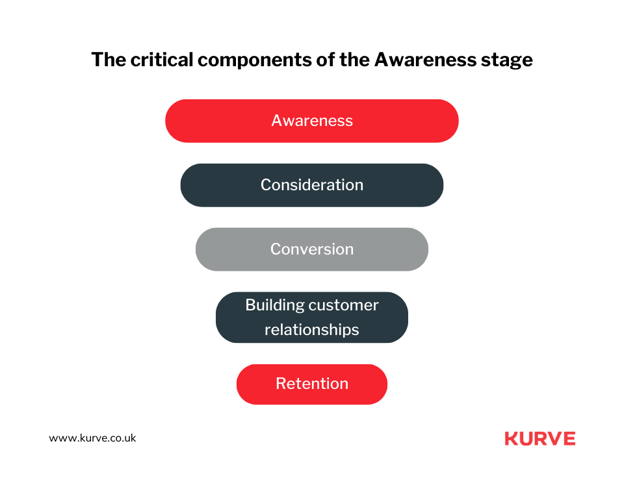
Set the Release Date
Setting a release date creates anticipation and allows you to build excitement around your app.
All apps need hype; without it, an app will struggle to get enough initial users to sustain momentum or, worse case, launch into the void.
Research the Market Trends
By researching market trends, you can gain valuable insights into your target audience's preferences, behaviors and demands. This information helps you understand the competitive landscape and identify market opportunities. It also helps you tailor your app marketing strategies. Staying up-to-date with the latest trends enables you to position your app effectively and differentiate it from the competition.
Know the User's Persona
Effective app marketing requires a deep understanding of your target audience. Understanding the demographics, interests, preferences and pain points helps you to create user personas. These personas allow you to craft personalized messages, choose the proper marketing channels, and design a user experience that resonates with your target users. By aligning your app's features and benefits with the needs of your user persona, you can increase awareness and attract the right audience.
Create a Website
A dedicated website for your app provides a central hub where potential users can learn more about your app's features, benefits, and availability. It is a valuable marketing tool to showcase your app, share user testimonials, and provide resources such as FAQs, support, and contact information. A well-designed and informative website can significantly raise awareness and drive app downloads.
Build the Digital Channels
Establishing a solid presence across relevant digital channels is crucial for app awareness. This includes leveraging social media platforms, creating engaging content and utilizing online advertising channels to reach your target audience. Building a solid digital presence ensures that your app gets in front of potential users. It helps generate interest and drives them to explore your app further.
In the Awareness stage, these strategies work together to create a strong foundation for the success of your app marketing efforts.
Acquisition
The acquisition is the second stage of mobile app marketing, focused on acquiring new users for your app. It involves implementing strategies and tactics to drive app installations and increase user acquisition.
Let's explore two critical components of the Acquisition stage.
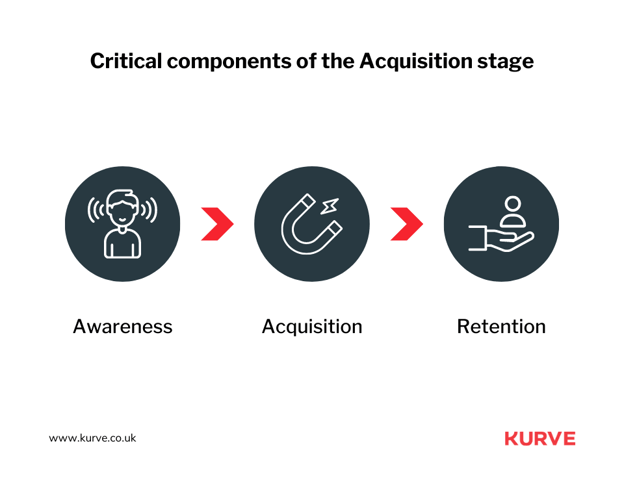
App Store Optimization (ASO)
App Store Optimization is optimizing your app's visibility and discoverability on the app stores. By conducting keyword research, optimizing your app's title, description, and metadata, and utilizing compelling visuals, you can improve your app's ranking in search results and attract more organic installs. ASO plays a critical role in increasing app visibility and driving user acquisition.
Paid Ad Strategy
Paid advertising is an effective way to reach a wider audience and drive app installations.
You can target specific demographics, interests, and behaviors by leveraging platforms such as Google Ads, social media ads, and mobile ad networks. A well-crafted paid ad strategy, compelling ad creatives, and optimized targeting can boost your app's acquisition efforts.
At Kurve, we understand the importance of efficient user acquisition and reducing costs. In our work with Sweatcoin, we reduced their Cost Per Acquisition (CPA) by 20% in a single month and delivered successful results. To learn more about our approach, check out our case study.
In the Acquisition stage, implementing effective App Store Optimization and paid ad strategies are crucial for driving app installations and expanding your user base.
Retention
Retention is the third stage of mobile app marketing. It focuses on engaging and retaining existing users to ensure long-term app success. It involves implementing strategies and tactics to keep users actively using the app and returning for more.
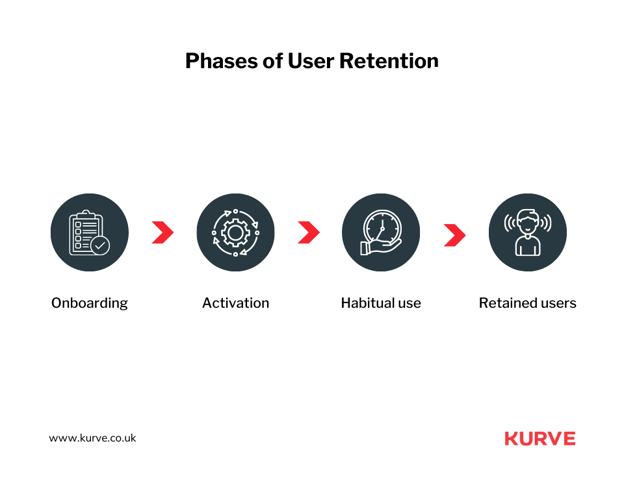
Push Notifications
Push notifications re-engage users and inform them about new features, updates, and promotions. These notifications can increase user engagement and drive repeat app usage by directly delivering targeted and personalized messages to their devices.
User App Reviews
Positive app reviews and ratings are crucial for building trust and credibility with potential users. Encouraging users to leave reviews and providing a seamless review process within the app can help increase social proof and attract new users.
A/B Testing
A/B testing allows you to split your audience (into groups A and B) and test variations on a campaign, and determine which performs better. This allows you to experiment with different app features, layouts, and messaging to determine what resonates best with your users. It's good practice to test and optimize various app elements regularly. Doing so can improve user experience, increase engagement and drive retention.
Personalization
Personalizing the app experience can make users feel the app meets their preferences and behavior. This connection can enhance user engagement and satisfaction.
You can create a tailored experience that keeps users returning for more by delivering personalized content, recommendations, and offers.
AI Integration
Integrating artificial intelligence (AI) technologies into your app can provide personalized recommendations, predictive analytics, and automated customer support. AI-powered features can enhance the user experience, anticipate user needs, and drive engagement and retention.
In the Retention stage, you can drive user engagement, loyalty, and retention by:
- implementing effective push notification strategies
- leveraging user app reviews
- conducting A/B testing
- incorporating personalization
- and utilizing AI integration
Essential Strategies in Mobile Marketing in 2025
This section will explore a range of essential strategies to help you succeed in mobile marketing in 2025. These strategies include establishing a solid online presence, leveraging social media and influencers, or implementing referral systems and email marketing campaigns.
By implementing these proven tactics, you can elevate your app's visibility, attract new users, and retain existing ones.
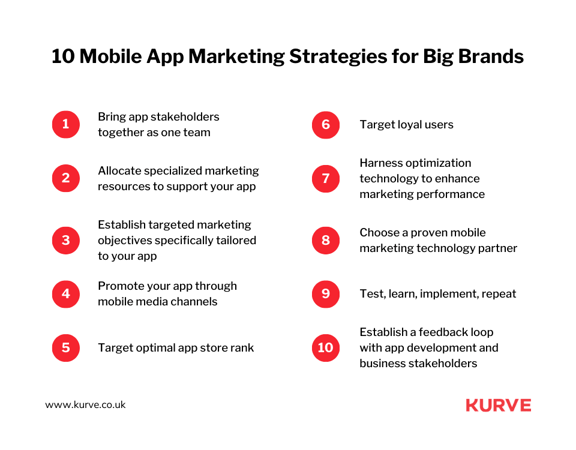
Establish an Online Presence
Building a solid online presence is essential for mobile app marketing success. Start by creating a dedicated website that showcases your app's features, benefits, and unique selling points. Then, optimize your website for search engines to increase visibility and organic traffic.
Leverage social media platforms by creating engaging profiles and sharing valuable content related to your app. Engage with your target audience by responding to comments, addressing queries, and building a community around your brand.
You can also guest blog on industry-related websites and collaborate with influencers. Both tactics will expand your reach and credibility.
Establishing an online presence will enhance brand recognition, drive traffic to your app, and increase user engagement.
Invest in Paid UA Campaigns
Paid user acquisition (UA) campaigns can boost app downloads and drive user acquisition. Start by identifying your target audience and understanding their demographics, interests, and behaviors.
Research and select relevant ad networks and platforms that align with your app's niche and target market. Then, create compelling and visually appealing ad creatives that communicate your app's value proposition.
Optimize your campaigns by targeting specific demographics, locations, and interests to reach the right users. Monitor and analyze campaign performance, making adjustments as necessary to improve conversion rates and maximize return on investment (ROI).
Social Media Marketing
Social media platforms offer immense opportunities for mobile app marketing. Begin by identifying the platforms where your target audience is most active and create engaging profiles for your app.
Develop a comprehensive social media strategy that includes content creation, curation, and scheduling. Craft high-quality, visually appealing content that showcases your app's features, benefits and use cases. Use various formats, such as images, videos, and interactive content, to captivate your audience.
Engage with your followers by responding to comments, asking questions and running interactive campaigns. Leverage social media advertising to expand your reach and target specific audience segments. Track and analyze social media metrics to optimize your strategy and drive user engagement.
Influencer Marketing
Influencer marketing has emerged as a powerful strategy for mobile app promotion. First, identify influencers who align with your app's target audience and have a solid online presence. Then, collaborate with them to create authentic and engaging content that showcases your app.
Encourage influencers to provide honest reviews, demonstrate app usage, and share personal experiences. This will build trust and credibility among their followers, increasing app downloads and user engagement. Offer incentives, such as exclusive access or rewards, to encourage influencers to promote your app.
Track the performance of influencer campaigns by monitoring app downloads, user engagement, and conversions attributed to their promotions. Maintain a long-term relationship with influencers to leverage their ongoing influence and reach.
Setup a Referral System
Implementing a referral system is an effective way to acquire new users through the existing user base. Design a referral program that rewards the referrer and the new user with incentives such as discounts, in-app credits, or premium features.
Make it easy for users to refer others by providing unique referral links or codes. Encourage sharing through social media integrations and personalized referral messages. Monitor and track referrals to ensure real rewards and measure the success of your referral program.
Promote your referral system through in-app banners, push notifications, and email campaigns. Highlight the benefits of referring friends, such as exclusive perks or additional functionality, to incentivize users to participate.
Do a Cross-Promotion from Other Apps
Cross-promotion allows you to leverage the user base of other apps to increase awareness and downloads for your app. Identify apps that share a similar target audience but are not direct competitors.
Establish partnerships with these apps to promote each other's apps through channels, such as in-app banners, push notifications, or dedicated app sections. To encourage collaboration, offer mutual benefits, such as revenue sharing or reciprocal promotion.
Ensure the cross-promotion aligns with the user experience and adds value to both app audiences. Track the performance of cross-promotion campaigns by monitoring downloads, user engagement, and retention rates. Then, continuously evaluate and refine your cross-promotion strategy to maximize its effectiveness.
Run an Email Marketing Campaign
Email marketing is a powerful channel for engaging app users and nurturing customer relationships. Create targeted email campaigns that provide your subscribers valuable content, updates, and exclusive offers.
It helps to segregate your email list. You can do this based on behavior, preferences, or demographics to personalize the content and increase engagement. Use eye-catching subject lines and compelling visuals to capture your recipients' attention. Include clear CTA buttons that direct users to relevant app features or promotional offers.
Analyze your campaigns by tracking open rates, click-through rates, conversion rates, and user engagement. Then, analyze the data to identify trends, optimize your email content, and refine your targeting strategies.
Build and grow your email list by implementing lead-generation tactics. For example, you can use in-app sign-ups, website opt-ins, or gated content offerings. Review and update your email marketing strategy to align with your users' evolving needs and preferences.
Setup Success Metrics and KPIs
Defining success metrics and key performance indicators (KPIs) is crucial for monitoring and evaluating the effectiveness of your mobile app marketing efforts. Identify the specific metrics that align with your app's goals and objectives.
Standard success metrics for mobile apps include app downloads, user engagement, retention rates, in-app purchases, and customer lifetime value. Set specific targets for each metric based on your app's industry benchmarks and growth projections.
Use analytics tools and platforms to track and measure these metrics. Not only will you gain insights into user behavior and app performance, but you will identify areas to optimize your marketing strategies.
In addition to quantitative metrics, consider qualitative indicators such as user feedback, reviews, and customer satisfaction surveys. These insights provide valuable feedback on user experience, app usability, and satisfaction.
Use this information to make data-driven decisions, iterate on your marketing strategies, and improve your app's performance and user engagement. Review and update your success metrics and KPIs to align with changing business goals and market dynamics.
Final Thoughts
That brings to an end our exploration of the world of mobile app marketing and the essential strategies to drive the success of your app.
From establishing an online presence and investing in paid user acquisition campaigns to leverage social media and influencer marketing, each strategy and stage plays a vital role in maximizing app visibility, engagement, and user acquisition.
To take the marketing of your mobile app to the next level and achieve your app's full potential, reach out to our team at Kurve. Our experts are ready to provide personalized strategies and guidance tailored to your app's unique needs. Visit our mobile app marketing page to learn about how we can market your app effectively.
Your app's success is just a click away.
